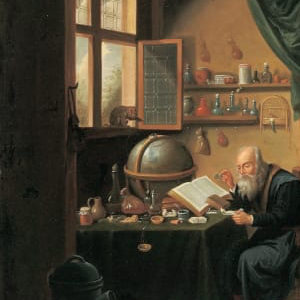17th Century Philosophy

In this course, we look at one of the most fascinating periods in the history of philosophy, the 17th century, which is often regarded as the period when Modern Philosophy was born. We will pay special attention to the scientific problems of the period, which motivated many of the philosophical questions that we will be discussing.
Class Schedule, 2019 Fall
(updated: 8/26/2019)
| The Scientific Revolution and Its Philosophical Problems |
|---|
| Aug 28, Introduction (Garber) |
| Sep 2, Some background (RS, Intro + ch. 1) |
| Sep 4, Montaigne (EMP, ch. 1) |
| Sep 9, Philosophy and practice (RS, ch. 3) |
| Sep 11, Bacon (EMP, ch. 2) |
| Sep 16, Galileo (EMP, ch. 3) |
| Sep 18, Descartes, scientist (EMP, ch. 4) |
| Sep 23, Hobbes (EMP, ch. 5) |
| Sep 25, Cavendish (WP, ch. 2) |
| Sep 30, Newton (EMP, ch. 6) |
| Descartes |
| Oct 2, Cartesians and Newtonians (RS, ch. 8) |
| Oct 9, Meditations I-II (EMP, ch. 7) |
| Oct 14, Meditations, III-IV (EMP, ch. 7) |
| Oct 16, Meditations, V-VI (EMP, ch. 7) |
| Oct 21, Objections: Elizabeth (WP, ch. 1) |
| Oct 23, Objections: Mersenne (EMP, ch. 8) |
| Oct 28, Objections: Hobbes (EMP, ch. 9) |
| Oct 30, Objections: Arnauld and Gassendi (EMP, ch. 10-11) |
| Rationalism after Descartes |
| Nov 4, Pascal (EMP, ch. 13) |
| Nov 6, Spinoza I (EMP, ch. 14, 158--179) |
| Nov 11, Spinoza II (EMP, ch. 14, 180--204) |
| Nov 13, Conway (WP, ch. 3) |
| Nov 18, Malebranche (EMP, ch. 15) |
| Nov 20, Leibniz I (EMP, ch. 16) |
| Nov 25, Leibniz II (EMP, ch. 18) |
| Dec 2, Cudworth (WP, ch. 4) |
| Dec 4, Review (RS, ch. 8) |
Assignments
First short paper (due: Oct. 16)
Final paper (due: Dec. 4)
(updated: 8/26/2019)